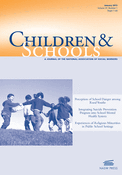-
Views
-
Cite
Cite
Katie L. Cotter, Paul R. Smokowski, Caroline B. R. Evans, Contextual Predictors of Perception of School Danger among Rural Youths: Baseline Results from the Rural Adaptation Project, Children & Schools, Volume 37, Issue 1, January 2015, Pages 9–17, https://doi.org/10.1093/cs/cdu021
Close - Share Icon Share
Students' perceptions of school danger have been associated with several negative academic, behavioral, and developmental outcomes. However, little research has focused on which contextual factors influence rural youths' perceptions of school danger. Through hierarchical regression analyses, the study presented in this article explored the relative importance of parent, peer, school experience, and neighborhood factors in predicting perception of school danger in a sample of low-income, ethnically diverse, rural youths. Of the included contextual predictor groups, results indicate that both peer and school experience predictors are the most influential contributors in explaining students' perceptions of school danger. The article concludes with a discussion of the implications for intervention programming and further research.





